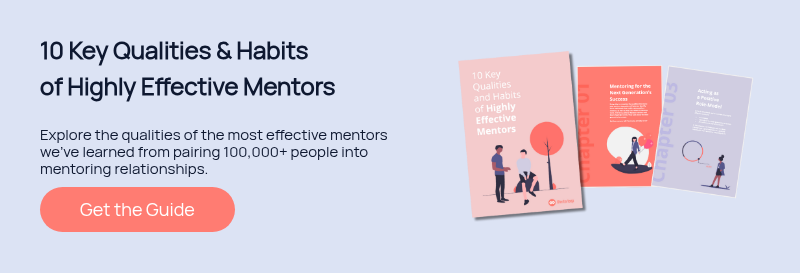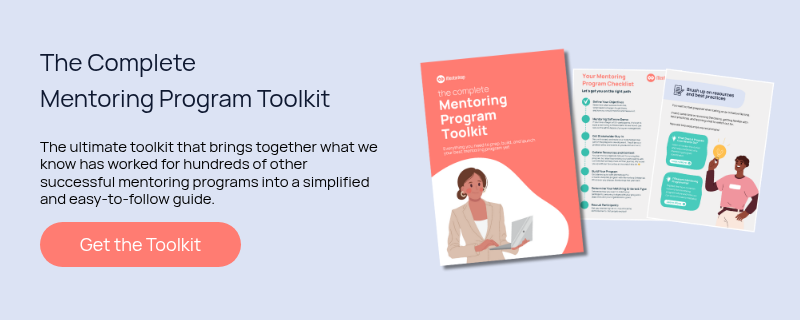The most important part of any relationship is communication, which is why it’s especially important for both mentors and mentees to take note of their own communication styles and ensure that they work for their mentoring partner. Active listening can help here, and is an important life skill that can be applied in various settings, such as the workplace, at home, or in any communication situation.
According to the Chartered Institute of Personnel and Development (CIPD) there are four principal methods that we use to communicate (with the exception of non-verbal behaviour).

via CIPD
It’s curious to note that unlike talking, reading and writing, we are not taught how to listen. CIPD notes that although we spend a lot of time ‘hearing’, experts estimate that only 25-50% of this time is spent actually ‘listening’.
So how do we learn how to listen, and more specifically, become active listeners?
When it comes to mentors specifically, an active listening approach is key; after all, mentors and mentees spend much of their relationship talking and listening to one another. Active listening is a technique in which the listener must fully concentrate in order to understand, respond and remember what is being said. Like any skill, it must be developed. Here are some ways you might notice that your own mentor is an active listener (and how you yourself can become one!).
This is Part 9 of our 10-part series on the 10 Key Qualities and Habits of a Highly Effective Mentor. Read Part 8 here.
What is Active Listening?
At the core of it, active listening is a communication technique that involves more than just hearing the words the speaker is saying. It involves focusing on what the speaker is saying, as well as their intonation, body language, and facial expressions. Active listening involves paying attention to what is behind the words the speaker is saying – their feelings, emotions, and concerns. Rather than just responding to the words, active listeners make sure that they truly understand what the speaker is communicating.
It’s an important life skill to have in any relationship, whether it is with a friend, family member, or colleague. It can assist in creating a safe space for the speaker to express themselves, and it allows the listener to gain a better understanding of the speaker’s thoughts and feelings. It does wonders in building trust and respect between people as demonstrates the listener is truly engaged in the conversation and is taking the time to understand the speaker’s perspective.
Luckily, this is a skill that can be developed with practice. It involves being more mindful of others’ words and body language, responding in a way that shows you’re truly listening and understanding – and it involves asking questions to gain further insight into thoughts and feelings. With practice, active listening can become an invaluable tool for creating meaningful conversations and relationships and ultimately, makes you a more empathetic person.
So let’s dive in and become better active listeners.
Quality 7 of Effective Mentors: They’re Active Listeners
1. They stop talking
This may seem like common sense, but it can be harder than you might think! When some people stop talking, it’s only because they’re thinking about what they want to say next. But not with active listeners! Active listeners suppress the urge to focus on how they want to respond and first actually listen to what you have to say.
2. They approach listening as a learning experience
As we said in Part 7 of our series, the most effective mentors are life-long learners. This goes hand-in-hand with them also being active listeners, as a trademark of active listening is to approach the listening experience as a learning one. Oftentimes, these listeners think of the speaker as someone who can teach them something—no matter who that speaker may be! For them, there’s always something to learn.
3. They guide the conversation
Active listeners are rarely happy with a “yes” or “no” answer. Instead, they avoid close-ended questions and employ open-ended ones, using broad queries to guide their mentees to discover solutions for themselves. Some examples of leading questions may be “What other alternatives have you considered to X?” or “How do you envision your career-changing once you do Y?”
In the book Never Split the Difference: Negotiating as If Your Life Depended on It, Chris Voss speaks to his version of this concept he’s dubbed as ‘tactical empathy’, where in conversation you show you’re listening by repeating back to them. In this approach, you’re not driving for a yes. You’re aiming for a that’s right. When you understand someone so fully—and that individual knows that you understand them—and you have the ability summarize their thoughts completely, they have no choice but to respond with that’s right and this builds camaraderie and trust.
The aim is to learn about your counterpart by asking open questions and showing you’re truly hearing them.
4. They make you think
While active listener-mentors use guiding questions to get their mentees where they need to be, they don’t let them off the hook with lofty responses. Instead, they ensure they pull out actionable items from every conversation. These may be discovered after asking questions like “Tell me how you plan to accomplish X,” or “How did you decide that Y was the best choice?” These direct, specific questions can help focus the conversation while bringing to light important insights and next steps.
5. They take into account more than just what you say
These mentors aren’t just paying attention to the words you’re saying, but how you’re saying it and what your body is doing while you speak. That’s because oftentimes, the real message we want to convey doesn’t take the form of a verbal response, it may be less cerebral and more emotional, expressing itself through our body language. Active listener-mentors know to look for this in order to truly understand what you want to get across.
6. They pay attention, summarise, and provide positive feedback
Ultimately, these mentors will pay attention and respect what you have to say, even if they don’t agree. In order to ensure they understand correctly, they’ll also often summarize what you’ve said by using statements such as “If I’m understanding you correctly, you…” or “Tell me if this is what you’re saying…” Last but not least, they’ll use positive feedback and body language—such as a nod, smile or positive “uh huh”—to encourage you and signify interest and understanding.
It’s important to note that active listening takes energy. People who listen actively don’t simply sit back and allow words to hit their eardrums. They sit up straight, take notes, ask questions, and repeat or “mirror back” what they’ve heard in order to ensure they’ve understood it properly. If you notice this type of behaviour from your own mentor during conversations, you’ve hit the jackpot! Your mentor is fully invested in you, what you’re saying, and helping you grow. The world would surely be a better place if we were all active listeners.
Why Active Listening is Important
Active listening has been shown to be helpful in many communication situations and helps to build relationships by showing the speaker that they are being heard and understood. This can help to create an atmosphere of trust and transparency. On the other hand, not listening or defaulting to offering unsolicited advice can actively lead to misunderstandings and feelings of frustration and resentment. It’s also a tool to help resolve conflicts and understand complex situations by really absorbing what is being said and attempting to comprehend it.
It encourages a space where all parties involved in a conversation are on the same page. By listening carefully and asking questions, it’s easier to gain a better understanding of the other person’s point of view and help to avoid misunderstandings and ensure that everyone is working towards the same goal.
Developing Effective Active Listening Skills
We’ve listed a number of ways your active listening skills can be learnt and honed over time with practice. Some further key components of active listening include:
- Watch body language: Keeping an eye on body language cues can help you understand more about what the speaker is feeling.
- Maintain eye contact with the speaker and really concentrate on their words.
- Encourage the speaker to continue talking by providing verbal responses such as “yes” or “go on”, as well as non-verbal cues such as nodding.
- Be aware of your personal biases or preconceived notions that may be influencing your listening.
- Remain open-minded and try to view the conversation from the speaker’s perspective.
- Be patient and allow the speaker to take their time to express their thoughts and feelings.
- Be mindful of your attitude: Your attitude towards the speaker will inevitably affect how much you are able to take in.
- Resist the urge to dish out advice or judgement during the conversation, and instead focus on truly understanding the speaker’s words and feelings.
- Practice active pauses: Taking pauses before responding can help you correctly process the information presented to you.
- Slow down your speech: Speaking quickly may prevent you from understanding the speaker and their context.
- Avoid multitasking: Multitasking during a conversation can be detrimental to the listener’s understanding, so try not to do it.
By actively listening and engaging with the speaker, you can create a safe and supportive environment for meaningful dialogue.
Ready to establish a culture of mentoring at your organisation? Why not start by sharing this series with your HR team?






